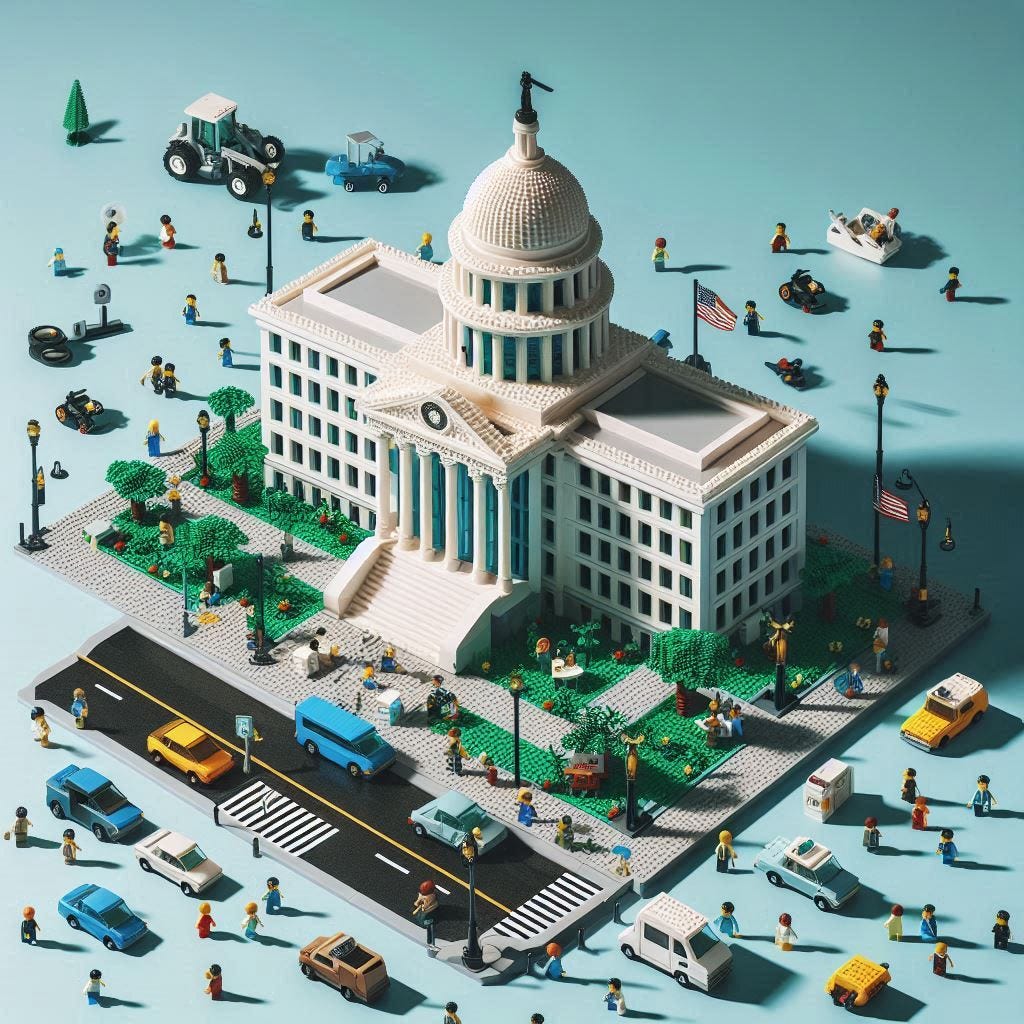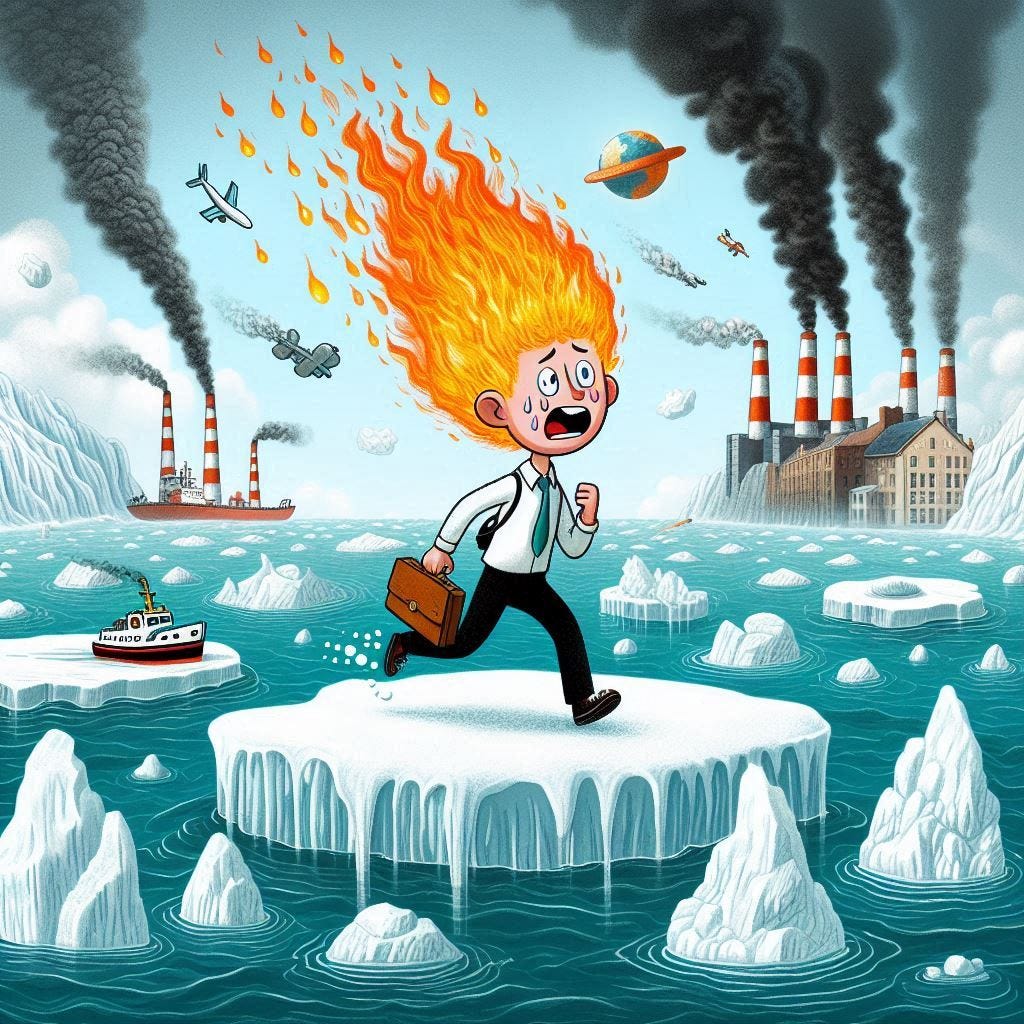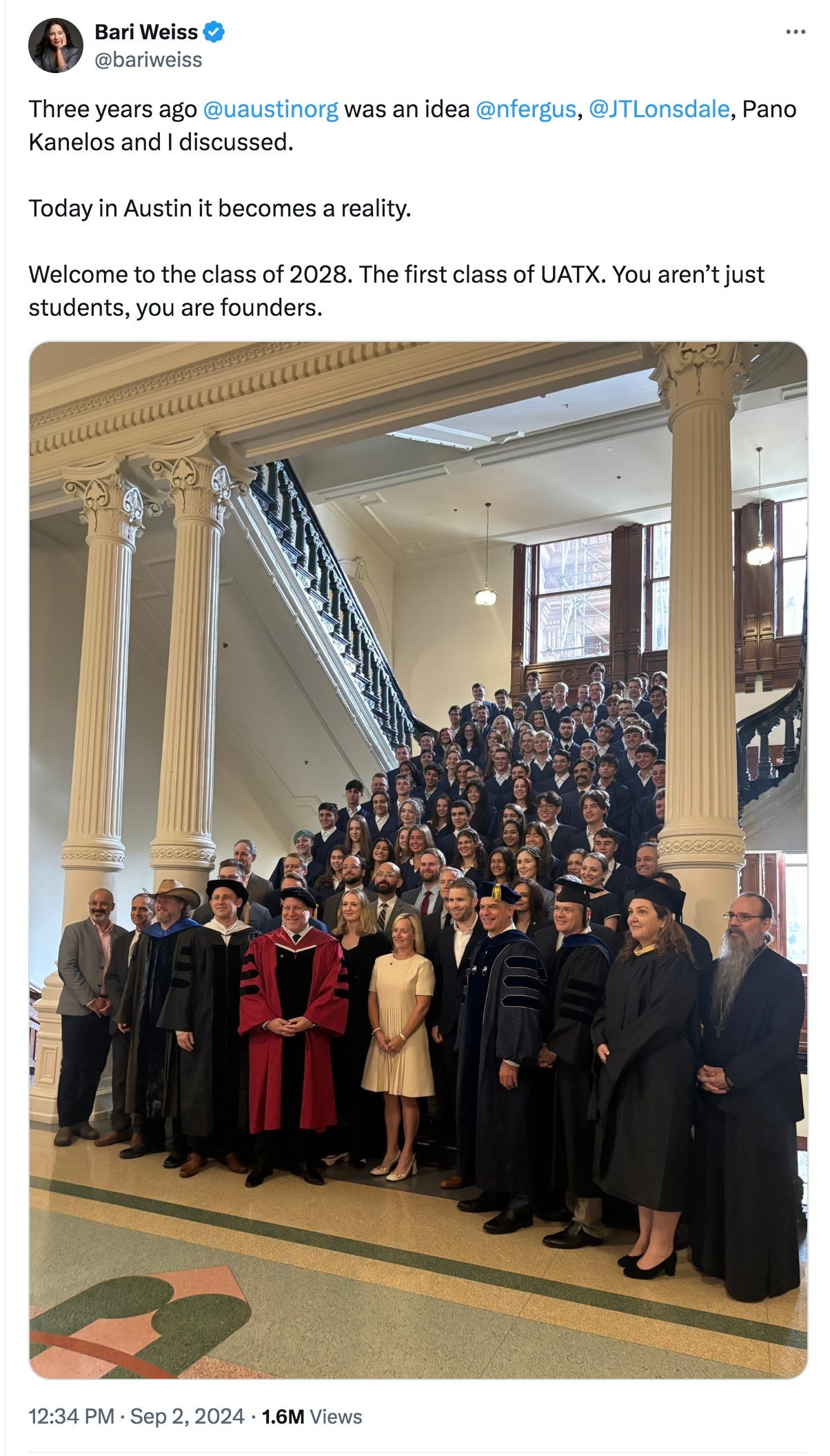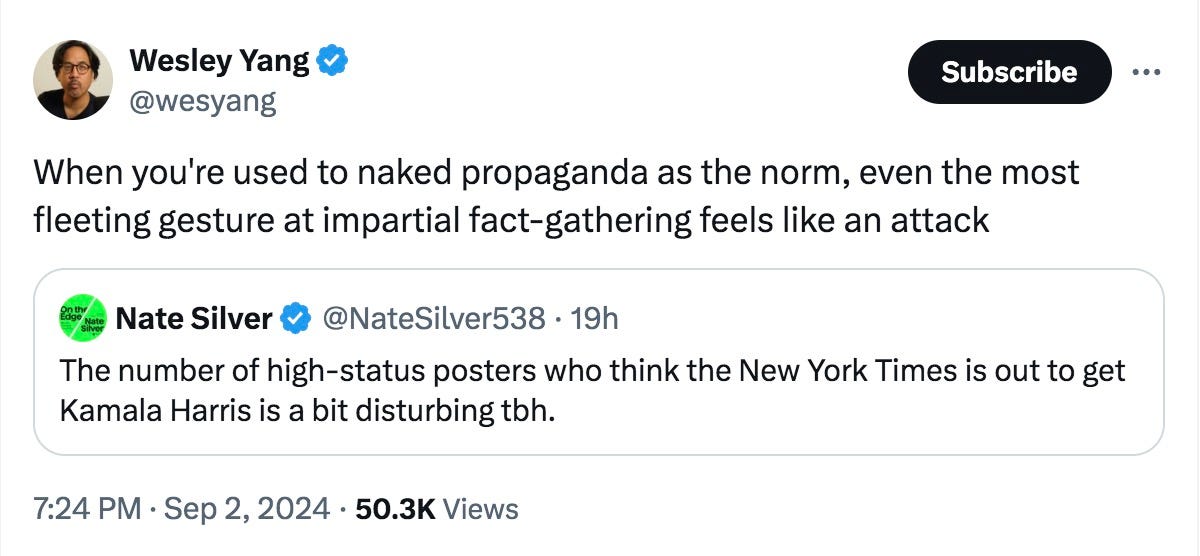E-Pluribus | September 3, 2024
Another reason for small government; rethinking the apocalyptic climate change narrative; and supply-side makes a comeback.
A round-up of the latest and best musings on the rise of illiberalism in the public discourse:
Jeb Hensarling: Fight Wokeness With Small Government
The size and scope of the federal government is arguably responsible for much of the division and rancor that permeates politics today. At the Wall Street Journal, Jeb Hensarling zeroes in on one particular potential benefit of smaller government - more freedom for citizens to influence society through the market.
Conservatives were slow to recognize how deeply the left had burrowed into corporate human-resources departments and C-suites, but they’re clearly making up for lost time. Consumers and shareholders are showing that they’re willing and able to defend their values with cash, credit cards and investments.
Many conservatives know they have this power in their own pockets without the government’s help. For years, conservatives were appalled at how the left used government to coerce private businesses into taking their side in the culture wars. Recall how the Obama administration pressured banks into choking off credit to politically disfavored customers such as firearms businesses. Or how the Biden administration pressured social-media companies into suppressing what it considered to be Covid misinformation. Today, however, a growing populist conservative movement has seemingly decided that government decrees to private businesses may not be such a bad idea as long as those dictates are conservative.
Red states including Oklahoma and Arkansas have empowered regulators to deny state businesses to asset managers that they determine have boycotted or discriminated against favored industries such as oil and gas. No doubt many investment firms are guilty of discriminating against certain industries, but it’s foolish to have political professionals rather than investment professionals construct portfolios and expect better returns. Isn’t this exactly what Republicans accuse Democrats of doing?
The better approach is to focus on corporate finance rather than corporate ideology. Florida last year enacted a law that did that. If you want to be a fiduciary of Florida state funds, you actually have to be a fiduciary; investment decisions must be driven solely by returns. Fortunately, asset managers across the U.S. are now speaking more about fiduciary duty than ESG. BlackRock, the nation’s largest asset manager, is even helping finance a new Texas Stock Exchange promising to be, of all things, apolitical.
The culture war isn’t only on the investment side; it’s permeating other aspects of business, too. In the tech sector, it’s no secret that social-media companies censor conservative voices. This has prompted some red states to pass laws attempting to regulate how social-media companies handle users’ content. Serious problem, bad solution. Populist conservatives should know they’re better off fighting with leftist tech CEOs than a government ministry of speech control. There’s room for debate over Section 230 liability protections, but in a free society companies shouldn’t lose First Amendment rights simply because they’re big or biased.
Read it all.
Nils Gilman, Jonathan H. Adler, Joseph Majkut, and Matthew Yglesias: Climate Catastrophism Leads to Illiberalism but Doesn’t Solve the Problem
The Institute for the Study of Modern Authoritarianism, publisher of The UnPopulist, held a conference this summer on Liberalism for the 21st Century. Part of the conference was a conversation between Nils Gilman, Jonathan H. Adler, Joseph Majkut, and Matthew Yglesias on the modern climate movement. One of the key topics: harmonizing true liberalism with genuine climate activism, without lighting anyone’s hair on fire.
Matthew Yglesias: One of my hot takes is that the climate issue is central to the global crisis of liberalism—more central than a lot of people realize. Because there isn’t as much debate about it inside of intellectual circles as there is about other topics. But I think that the push to address climate change both drives left-wing people towards very illiberal approaches—substantively and procedurally—and then global efforts to address climate change is fuel for a lot of right-wing populist backlash.
In America, climate movement people used to look across the Atlantic very wistfully and say, “Why can’t we just have this great bipartisan consensus like they have over there?” But where you have a bipartisan consensus, you get a backlash from people who are outside the system. The far right has definitely gained steam off of immigration, but also off of climate backlash stuff. And in a way, the liberal answer to climate backlash is less obvious. Liberal politicians are comfortable saying, “Okay, people got mad about the border, so we got to send some more agents down there.” Climate is tough. A large, well-funded movement that has a lot of purchase in the media, a lot of activist clout, will tell you, “You are dooming society to extinction if you don’t do exactly what we want,” which creates limits to political flexibility, which creates a lot of problems.
So we want to talk about both that dilemma and possible solutions. We’ll go first to Nils on apocalypticism and liberalism and how it works together.
Nils Gilman: I totally agree with you, Matt, that this topic is a really critical one—not just for the substance of, How do we address climate change?, but also for thinking about, How do we do that while preserving liberalism?
[. . .]
[A]sk yourself a question, What's more realistic: the proposals by the left that wants some sort of a global government that’s going to dictate from the top down carbon emission and consumption standards (to make everybody put on the hairshirt all over the planet), and figure out what we're going to do in terms of equity with development in the Global South … is that a more realistic thing? Or is it more realistic just to shoot people at the border if you buy that we only have six years now?
I also want to say that we don’t just have six years—[Greta Thunberg said we have 11 years left in 2019]—and it’s absurd to think that we do. This is a long-term problem. It’s been literally hundreds of years in the making in terms of building a carbon-based civilization all over the world, and it’s going to take us probably almost as long to unwind that, and we’re going to have to live with the consequences of the fact we put a ton of carbon—I mean, gigatons of carbon—into the atmosphere. That’s just something we’re going to have to deal with. Acting like this is a policy solution that has to happen overnight, and that there’s going to be no give-and-take on this politically, is deeply illiberal. The more one says that, the more one pushes away from liberalism as a general set of principles.
Jonathan H. Adler: [When] we step back and think about environmental protection generally as something that we ask government to do, or what the liberal case for environmental protection is, it begins with the government protecting people and their property from harms caused by the misuse of other people’s property.
[. . .]
Historically, that was the beginnings of environmental policy, before we had big federal regulatory agencies. Over time, we realized that it’s often not this bilateral problem. It’s not one farmer and one homeowner; it’s lots of people, lots of activities—the accumulation of many activities in a particular area, so that the concentration of effects reaches a point where it actually becomes a problem. Again, the same principles would underlie the early zoning laws that were designed to deal with this. How do we prevent these sorts of conflicts ex ante rather than ex post? The Progressive Era smoke control movement [was] very much designed to make sure you can burn coal, but you can’t burn it in a place that’s going to make people nearby sick, and that resulted in moving a lot of these facilities outside of the cities.
At a certain point, the politics of environmental issues, as the problems become more complicated, as the stakes become larger, make these coordination problems look more difficult, and they’ve produced this illiberal response of not merely saying, not just in terms of the policy measures, but the reaction of being involved, “the problem can’t be real.” The need to deny the problem so as to deny the rationale for government intervention. It’s this binary choice: if it’s a catastrophe, yes, we have to do terrible things. But if it’s not, we can ignore it. But of course, that’s not the traditional liberal way of thinking about these sorts of problems.
I worked at the Competitive Enterprise Institute, which I guess is still today the leading don’t take action on climate change organization here in D.C. A few years after I left and went to academia, I wrote a paper saying, “Look, if we take these ideas about protecting property rights—not merely from the government but from others—seriously, you don’t have to be [a catastrophist] to think that climate change is a problem within this traditional, classical liberal framework.” You can take very modest, non-apocalyptic scenarios about things like sea level rise. And you can point out that just as there are old cases about pig farmers, there are old cases about land modifications that cause the flooding of a neighbor’s property, and it was recognized [that if] you do something on your property that causes standing water on your neighbor’s property, that’s a trespass, that’s a property rights violation. We can have a discussion about when it’s not one landowner versus another landowner, it’s millions of people emitting stuff, and millions of people’s land being affected very far away, about what sort of institutional mechanisms we want to have to deal with that … but you don’t actually need to prove very much. You don’t need to prove we only have six years to show that that’s a problem.
[. . .]
Adler: There’s a lot of pressure to maintain what is ultimately a similar narrative. There’s a belief, and it’s a well-intentioned belief, that the nuts and bolts on climate change are complicated: It’s not immediate, so it’s a long-term problem, but it’s still very important. And the way you get—in a democratic society—people to act is simplifying it and scaring people.
So the folks [who] want to attribute every hurricane or whatever to climate change aren’t trying to … this isn’t a stalking horse for some broad liberal agenda. It’s, well, “We’re oversimplifying some, but this is the sort of thing we are worried about over the long term, and we don’t think the democratic process will be able to handle the complexity that what’s really going on is we’re increasing the upward potential of hurricane damage and hurricane storms and the likelihood over a longer period of time. But we can’t say it about a particular storm.” And if you try to say that on the evening news, people are going to change the channel, or they’re going to fall asleep. Whereas, if you say, “Oh, my God. [Hurricane] Beryl or whatever is the result of climate change,” maybe that gets politics in action. The problem, of course, is that when someone goes and looks at the science, and they pull out the IPCC, and they talk about, “Okay, what are the different levels of attribution we can engage in with regard to different types of changes in weather?,” and they see the IPCC is saying, “Hurricanes? Yeah, we can’t really tie the knot yet,” well, it’s like we saw with Covid: “Well, now they’ve exaggerated. Climate change is still a problem, but the specific thing they led with wasn’t true, so maybe that’s an excuse that gives me permission now to say they’re lying about everything.”
In a democratic polity, it’s undermined the ability of science to inform the policy process, because the way the science of climate is presented oversimplifies and glosses over a lot of complexity, and, in some cases, just says stuff that isn’t quite true.
Read it all here.
Judge Glock: A New Supply-Side Agenda
Talk of “supply-side” economics can still elicit eye-rolling or eyes glazing from those who think Ronald Reagan just bluffed his way through the 1980s. But Judge Glock at City Journal says supply-side ideas deserve a second look as we consider ways to deal with today’s seemingly intractable political problems.
In the 1970s and 1980s, supply-side economics offered novel solutions to America’s ills, which included declining productivity, rising inflation, burdensome taxes, and a growing number of citizens dependent on government. Though supply-side advocates promised no magic solutions, they argued that a combination of deregulation, stable monetary policy, lower top tax rates, and reform of welfare programs would revive the American economy. Both political parties embraced at least parts of these reforms, laying the foundation for decades of prosperity.
The United States in 2024 faces many similar problems—and from some of the same causes. Relearning the lessons of supply-side economics is thus essential for restoring America’s economic dynamism.
[. . .]
Many forget, or are unaware of, just how nonsensical the regulations were on many of America’s businesses in the 1970s. Trucks had to get permits from the Interstate Commerce Commission to ship loads from one state to another, and they could do so only at predetermined government rates. If a trucker couldn’t get a permit on the way back, he would have to “deadhead,” that is, drive with an empty trailer. Airlines also had to apply for permits and rates—in their case, to the Civil Aeronautics Board. In deference to incumbent airliners, the board kept ticket prices absurdly high, so carriers tried to compete with perks like steak cooked to order and “piano bars” in the sky. That may sound enticing, but the nosebleed prices excluded most Americans from air travel and proved extraordinarily wasteful. The average plane flew barely half full.
Other regulations kept the economy sluggish and services overpriced. The largest corporation on earth was AT&T, which had maintained a regulated telephone monopoly for almost a century. In the early 1980s, its profits exceeded those of any corporation in history, as consumers had no choice but to use its product. Laws prevented banks from branching and, for a while, even banned new ATMs as a type of “branch.” With little competition, banks followed what was known as the 3-6-3 rule—borrow at 3 percent, lend at 6 percent, and hit the golf course by 3 pm. For incumbents in these regulated industries, life was comfortable and profitable. But consumers paid the price for that complacency.
[. . .]
The greatest change in spending since Reagan came into office has been an explosion in government health care. In the 1980s, total government spending on health care was about 3 percent of GDP. It’s now over 8 percent and going higher. In the 1980s, health care made up a bit over 10 percent of the federal budget (excluding interest payments). It’s now almost 30 percent. A big reason for the shift: an aging America, with too few children born. Americans over 65 were 11 percent of the population in 1980; they are 17 percent today and will exceed 20 percent in the next decade. The “birth dearth” also means proportionally fewer young people around to shoulder the burden of future eldercare.
Beyond increased spending for health care and the elderly, government transfers are much more likely to go to the middle class than before. Government payments to non-elderly middle-income households grew from 40 percent to 50 percent of all transfers from the early 1980s to before Covid hit, while the proportion of means-tested transfers to such households went from 25 percent to 50 percent. In an earlier era, supply-siders pointed to poor adults and single mothers as serious drains on the public fisc. In 2024, the main burden is retired and middle-class adults, with both groups absorbing expansive funding for an ever less efficient government health-insurance system. It’s not obvious that these groups truly benefit from these programs, since they also pay substantial taxes for this expanded welfare state.
[. . .]
The supply-side victory of the past was substantial in the areas that it sought to reform. Price controls, once widespread, now seldom apply across economic sectors, though revival efforts do occur. The Federal Reserve now actively combats inflation, no longer believing that it’s powerless to do so. Many ineffective welfare initiatives have been overhauled to include work requirements, and top marginal tax rates remain substantially lower than in the past. Yet ever greater government intervention in other areas have more than offset these previous gains.
What would a twenty-first-century supply-side agenda look like?
Start with reining in the federal bureaucracy. Reformers once aimed to remove regulatory power from the courts and Congress, which had demanded more onerous rules, and instead place it with the executive branch. Presidents Jimmy Carter and Ronald Reagan pursued deregulation, so the move toward executive authority then made sense. The famous, or infamous, Chevron v. NRDC case of 1984, which gave regulators carte blanche to decide the limits of their own power, actually involved the Supreme Court’s approval of a deregulatory effort by the Environmental Protection Agency against green activists who wanted the courts to tighten air-pollution rules.
Things are different four decades later. Executive-branch regulators have become too numerous, independent, and politicized for even deregulatory presidents to control them. Since these bureaucrats now handle fewer questions about simple price and quantity (e.g., “Should airline tickets go up or down 5 percent?”) and more about how far their reach extends (e.g., “Can the EPA control occasional puddles that form in people’s yards?”), courts need to enforce limits on the authorities. Though the Supreme Court recently struck down the so-called Chevron doctrine, courts can better supervise Congress’s delegation of power to bureaucrats. Congress should also consider new laws in the spirit of the REINS Act, which the House passed in 2023, requiring it to approve regulations that have a significant economic effect.
Read the whole thing.
Around Twitter (X)
Via Bari Weiss, an update on the University of Austin, which aspires to be what universities were once meant to be:
The Foundation for Individual Rights & Expression has an update on the case from Surprise, Arizona:
And finally, some are just fed up with that right wing rag, the…New York Times?









